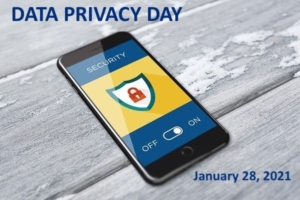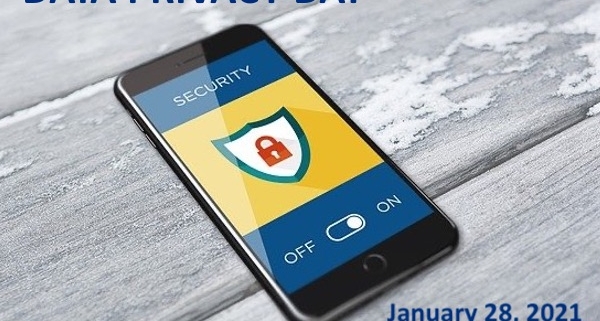Privacy checklist – data privacy day
 Data Privacy Day is on January 28 and it serves as a reminder to take stock of your personal privacy and to follow it up with actions to protect and enhance it. Some people say, “I don’t care about my privacy because I have nothing to hide,” but that is unwise. There is abundant personal data online and in the wrong hands this can cause harm. For example, publicly available personal data combined with compromised sensitive data can lead to financial loss and takes an emotional and time consuming toll when money and identities are stolen. Taking as much control of our privacy as possible is worthwhile because it can prevent damage and/or reduce the negative consequences of identity theft and other privacy shortfalls.
Data Privacy Day is on January 28 and it serves as a reminder to take stock of your personal privacy and to follow it up with actions to protect and enhance it. Some people say, “I don’t care about my privacy because I have nothing to hide,” but that is unwise. There is abundant personal data online and in the wrong hands this can cause harm. For example, publicly available personal data combined with compromised sensitive data can lead to financial loss and takes an emotional and time consuming toll when money and identities are stolen. Taking as much control of our privacy as possible is worthwhile because it can prevent damage and/or reduce the negative consequences of identity theft and other privacy shortfalls.
Protect your personal information
- The more a business knows about you the more it can profit from your personal data. Some businesses sell personal data and others use it to tailor marketing to you so that you are more likely to spend money on their products or services. Your personal information benefits political organizations and charities because used correctly your data can ascertain your opinions and your likelihood of taking actions to benefit those organizations. When you sign up for a contest or sweepstakes and provide personal data it’s important to weigh the cost vs. the benefit. Odds of winning a sweepstakes are not high but the information you are providing is valuable to the business. Anytime you share your email address, birthdate, address or habits, take a moment to understand what you’ll get in return and if that benefit is not great enough, don’t share. Even when you trust the source, don’t give more information than necessary. For example, do not provide your social security number to even a trusted source unless there is good reason for that source to have it.
Watch out for malicious links
- Phishing emails have improved and old strategies of knowing that an email was fake based on format and grammar errors are not sufficient. If your intuition signals a potential problem, don’t take the chance. For example, an email from a friend with an attachment and very little other information may signal your friend’s email has been hacked. Emails that threaten a consequence if you don’t take an urgent action (i.e. your bank account will close if you do not confirm something by clicking on a link) are often malicious. When uncertain, go directly to the source without clicking a link to get there. Click here to read an article that gives more information about phishing emails and also tells you what to do if you accidentally click on one.
Think carefully before you share
- Posts on social media last a long time and people can take screenshots and can download and share almost anything found online. Regardless of privacy settings you should assume every post can ultimately be seen by unintended recipients. Consider who will see the post, what it might reveal about you, how it might be perceived and what the consequences will be if it is seen by unintended recipients – both friends and enemies. When in doubt, do not post!
Manage privacy settings
- Check your privacy and security settings on all social media platforms, web services and apps that you use and adjust the privacy levels as needed. Pay attention to what you use on each device because each device, browser and app will have different privacy and security features and each item will have to be handled individually.
Make your passwords long and strong
- Use long passwords with a combination of upper-case and lower-case letters, numbers, and symbols. Passwords should be a minimum of eight characters and twelve or more characters is more appropriate for financial and email accounts. Don’t use the same password for multiple accounts, especially email and financial. Keep a paper list of your passwords in a safe place but not on or near your computer. Ideally, use a password manager because then you only have to memorize one very long and unguessable password. (You can keep it written down in a safe location.)
Use apps with awareness and caution
- Many apps ask for access to personal information, such as geographic location, contacts list, texts, photos and more. Pay extra attention to apps that require access to information that is not relevant for the services they are offering and avoid those apps completely if you are unable to use them without sharing that unnecessary information. Delete unused apps and keep others secure by reviewing privacy settings and by updating apps when updates become available.
Use double authentication on important accounts
- Even though it is often inconvenient, use the strongest authentication tools available on medical and financial accounts or any account that can put you at risk such as your email accounts or logins to a business website.
Understand and secure all of your Internet-connected devices
- Smart devices are increasing our risk of being breached. My son heard a noise coming out of his Nest security camera and discovered someone had hacked into it and was able to see all that the cameras could see. His solution was to remove the cameras completely after that. Smart thermostats, garage door openers, alarm systems, voice control systems, cars, refrigerators, medical devices and baby monitors are part of the growing list of devices that watch our homes and track our location. Read privacy policies and understand what data is being collected and how it will be used. Secure your devices the same way you’d secure your computer. Use strong passwords, use malware and virus protection and check all privacy and safety settings. Do necessary updates on these because updates are often security updates.
Delete personal online data when possible
- To begin removals yourself for a few major sites, click on this link for a list of step-by-step tutorials.
- If you hire a business to do removals for you.
- Check Better Business Bureau and online reviews.
- Confirm the number of sites they will remove you from.
- Know what is excluded.
- Understand warranties.
Data Privacy Day is a good reminder of the importance of online privacy. That said, online privacy takes maintenance so once you decide you care about it, be sure to stay on top of it regularly.
Until next time,… Stay Cyber Safe.


Leave a Reply
Want to join the discussion?Feel free to contribute!